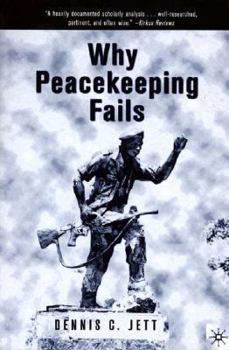Why Peacekeeping Fails
Select Format
Select Condition 
Book Overview
Dennis C. Jett examines why peacekeeping operations fail by comparing the unsuccessful attempt at peacekeeping in Angola with the successful effort in Mozambique, alongside a wide range of other peacekeeping experiences. The book argues that while the causes of past peacekeeping failures can be identified, the chances for success will be difficult to improve because of the way such operations are initiated and conducted, and the way the United Nations operates as an organization. Jett reviews the history of peacekeeping and the evolution in the number, size, scope, and cost of peacekeeping missions. He also explains why peacekeeping has become more necessary, possible, and desired and yet, at the same time, more complex, more difficult, and less frequently used. The book takes a hard look at the UN's actions and provides useful information for understanding current conflicts.
Format:Paperback
Language:English
ISBN:0312239424
ISBN13:9780312239428
Release Date:April 2001
Publisher:Palgrave MacMillan
Length:236 Pages
Weight:0.55 lbs.
Dimensions:0.6" x 5.5" x 8.4"
Customer Reviews
3 ratings
Good Examination of Peacekeeping Problems
Published by Thriftbooks.com User , 22 years ago
--The reviewer is a peace operations analyst in Washington DC--This book was, as other reviewers noted, originally a dissertation. So off the top, a prospective reader should know that this is a scholarly piece of work, not a novel. It is a well-written and quite readable work, though.Ambassador Jett on balance does a good job of outlining why UN peace operations can fail, using the Mozambique and Angola cases to good affect. The work comes across as somewhat ill tempered at times, and is not happy reading if one is a supporter of peace operations. By and large, the arguments and conclusions make sense, in terms of outlining the failures and why they happen. There does not seem to be enough credit given to the successes, and the reforms that have taken place to fix some of what Ambassador Jett discusses.Those are quibbles, though. The fact is, this book is a must read for those studying conflict resolution, peace operations, or any related field. It is a good read for anyone, given the current news. The book will not provide any potential solutions to the problems noted so well, which is an issue, but at least the reader will gain a good understanding of the problems.
Insightful and applicable
Published by Thriftbooks.com User , 24 years ago
The new paperback edition of Jett's book updates the analysis of the UN's missions to Mozambique and Angola, and the new introduction addresses the renaissance in peacekeeping that has occurred since the first edition. While this is a scholarly work, originally created as a doctoral dissertation, the subject is pertinent and the writing is readible. The text is designed to highlight differences in the two missions, one of which has been moderately successful, the other of which was an unmitigated disaster. It identifies three phases: pre-deployment, deployment, and post-deployment, and shows how these differences affected the outcome. It also identifies three groups who must cooperate to create success: the peacekeepers, the target nation, and the surrounding states. The failure in Angola can be traced to all three phases and all three groups. Likewise, the success of the Mozambique mission can also be traced to all three phases and all three groups. Jett's analysis is superb. The lessons that can be drawn from this work would prove invaluable, if properly implemented in peacekeeping going forward. The necessary changes in the UN and its member nations will be challenging, but knowing they must be made is a good first step. Let us hope the people with the power to set peacekeeping on the right course are reading and remembering this one.
A good analysis by someone who knows what he is writing on
Published by Thriftbooks.com User , 24 years ago
So often and so regrettably, books by diplomats and former diplomats tend to be boring recollections of memoirs, trying to give the author's views on countries and issues of which the authors themselves understood little or nothing. I am thinking, among others, about Nathaniel Davis' book on Allende's Chile, which was at the same time a brilliant self-defence statement denying US intervention in the 1973 coup. In contrast, this book by Christopher Jett, a former US ambassador to Mozambique, is a thorough analysis of events, offering personal views insofar as any author rightly has these, but without becoming a boring recollection of personal stories. Ambassador Jett offers us a rigorous analysis of why peace-keeping succeeded in Mozambique and failed in Angola. It provides excellent material on these two conflicts and the UN intervention there, and on the respective countries and their internal politics. Likewise, the book is also excellent reading, vividly written and captivating - much more than diplomats can usually be. I would recommend this title to anyone studying comparative conflict studies and conflict resolution, or/and the politics of that part of Africa.






